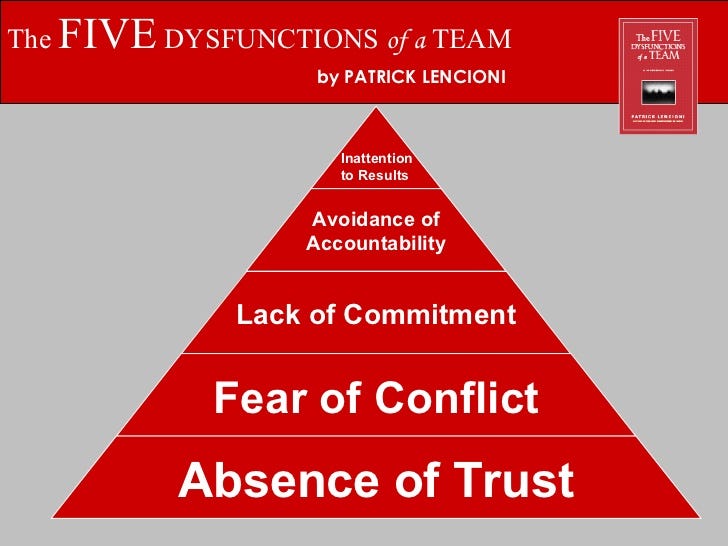One of my favorite books on Teamwork is The Five Dysfunctions of a Team, by Patrick Lencioni. The book presents a simple pyramid framework to help organizations improve communication and teamwork. It presents five potential pitfalls that can lead to a dysfunctional team and helps teams identify which areas are impacting team performance.
Starting from the base of the pyramid and moving upwards – each level is interrelated. Here is a quick summary of how each level is connected to the next:

Absence of trust occurs when teams are unable to be vulnerable with each other and share weaknesses openly. Funnily enough – trust and vulnerability also play an important role in supportive Mental Health conversations in sales. When teams are unable to trust each other, they fear conflict and passionate debate.
Without healthy conflict, the opinions of some team members are left out and never shared. This leads to some team members lacking commitment to the final decisions being made. Without commitment, it becomes easy to avoid accountability because clear responsibilities were never agreed to.
Finally without accountability, inattention to team results erodes team performance and a lone wolf mentality takes over. Individuals start to prioritize their own needs (ego, career goals. etc.) ahead of collective team goals. This pulls the team apart and paralyzes the collective group from moving forward.
What’s interesting about the Five Dysfunctions of a Team is that they could also be labeled the Five Dysfunctions of Mental Health.
Five Dysfunctions of Mental Health
Absence of Trust
Our mind, body and immune system have been evolving over millions of years. This means millions of people before us have experienced great suffering and have learned to survive.
We need to trust that we have the innate tools to protect our Mental Health when experiencing high levels of stress. If we succumb to feelings of helplessness, we’ll have a tough time believing that we can learn new ways to manage our anxiety and depression in a healthy way.
Fear of Conflict
Many of us fear our inner conflict and avoid exploring the inner workings of our mind. This avoidance stops us from releasing emotions, past experiences and memories that are causing our Mental Health to decline.
Adopting a curious mindset that is focused on learning and growth can make this exploration process less scary. We also need to improve our Emotional Literacy so we can put our feelings into words and communicate how we’re feeling to others.
Lack of Commitment
Far too often, we only commit to supporting our Mental Health when it’s too late and our body is already shutting down.
Maintaining a positive state of well-being requires daily practice and treating self-care like a multivitamin we take regularly. Consistently caring for ourselves requires commitment and self-compassion. It means we’re committed to setting healthy boundaries to ensure we’re showing up our best selves each day.
Avoidance of Accountability
If we’re constantly blaming and/or judging others when negative experiences occur, then our Mental Health will always suffer. In every situation, we’re accountable for our thoughts, emotions and behaviors because these are always in our control.
On some days it can be hard to control how we’re thinking, feeling and behaving. We need to practice building mindfulness so we can respond logically, rather than react emotionally in every situation we face.
When we encounter a negative experience or unkind outcome like a deal falling through, we must pause and ask ourselves:
- What is my part to own in this experience and relationship?
- What mistakes have I made in how I’m thinking, feeling and behaving that I now need to take responsibility for?
- How can I learn and grow from this experience to perform better in the future?
Conflicts between two people is always a two-way street and we need to be open to owning our part. Becoming more accountable for how we’re responding to situations allows us to find new ways to continuously improve our Mental Health.
Inattention to Results
Improvements in Mental Health are not immediate and personal growth does not happen in a linear fashion. It usually feels more like two steps forward, one step down, four steps back, three steps up and five steps forward.
We need to be patient and understand that we all have good and bad Mental Health days. This is part of being human and experiencing personal growth happens through discomfort.
If we’re not attentive to small changes in progress and improvement to our Mental Health as a result of our hard work and practice, it will be hard to stay motivated. Journaling, reflection, meditation and gratitude can help keep progress visible.
Maintaining Positive Mental Health
Next time you notice your Mental Health start to decline – use the Five Dysfunctions of Mental Health as checklist to identify why your Mental resilience may be breaking down.
For more tactical strategies and best practices to improve your Mental Health, Resilience and EQ in sales – checkout the online course below. This will help you address any of the five dysfunctions you may be facing.
Online Course: Improve Sales Performance Through Better Mental Health
About The Author

Jeff Riseley is currently the Founder of the Sales Health Alliance and Mental Health Advocate. With over a decade of sales experience – Jeff understands the importance of Mental Health in achieving peak sales performance.
Jeff combines his sales (Sales Knowledge Institute) and Mental Health expertise to improve sales performance through a mix of sales mentorship and mental health best practices. His strategies have helped sales teams improve their sales process, while helping them become more motivated, resilient and better equipped to tackle stressful events within sales.
He is currently delivering these strategies through on-site workshops, coaching and speaking engagements. To explore working with Jeff contact him at [email protected]




